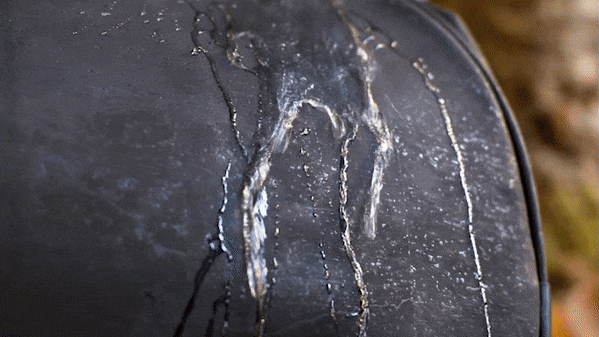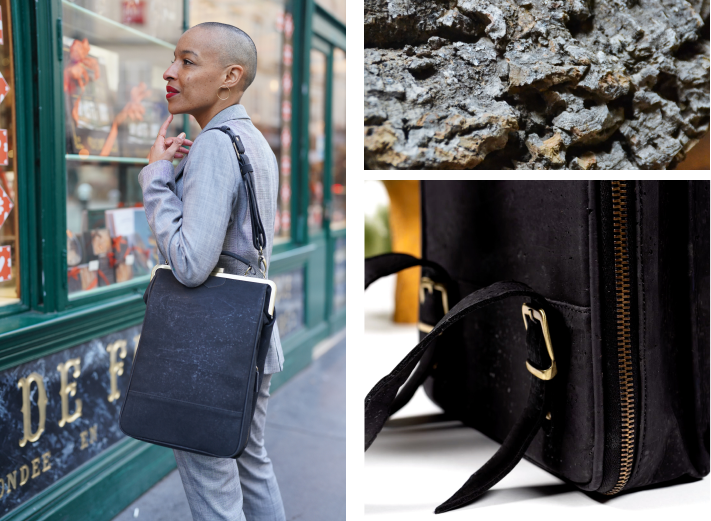The world is becoming more environmentally conscious, and the fashion industry is starting to adapt to it. Brands and designers are beginning to explore sustainable materials and practices that minimize harm to the planet. Some of the most promising sustainable textiles on the horizon are also fabrics that are vegan!
From pineapple leaves to hemp, these vegan fabrics we’ve compiled are sustainable, durable, and stylish. Here we take a look at some of the best vegan fabrics paving the way to fashion’s eco-friendly future.
-
Cork Fabric
Sometimes known as cork leather or cork skin, cork fabric is made from the bark of cork oak trees that grow in Mediterranean Europe, primarily in Portugal. It’s a recyclable and renewable resource that is carbon-negative, environmentally friendly, and biodegradable.
Cork is a vegan material produced without harming any animals or plants. In fact, removing the bark of cork oak trees periodically actually stimulates their generation and helps them grow. Harvesting cork prevents the deforestation of oak trees that house endangered species like the Iberian Lynx.


Cork is a lightweight, durable product that is strong, long-lasting, and can make elegant products with a smooth, supple finish. It can be used to make many fashion items:
- Accessories
- Wallets
- Purses, including Laflore’s own line of convertible cork handbags
- Shoes
-
Organic Cotton
Durable, absorbent, comfortable, and even hypoallergenic, organic cotton is one of the most popular plant-based fabrics around. Grown from natural cotton seeds without the harmful effects of pesticides, organic cotton is also produced using organic methods and practices. In fact, during its production process, no toxic chemicals or pollutants are released into the air or water as toxic chemicals and dyes are not used.






-
Bamboo
Renowned for its softness and durability, bamboo is a sustainable plant fiber that is quickly becoming one of the most popular vegan fabrics around. Extracted from the bamboo plant, bamboo fabric is biodegradable and can be used for everything from clothing to accessories, such as
- T-shirts
- Sheets and blankets
- Towels
- Socks
- Household textiles


Despite being the most popular and cost-effective option to produce, the bamboo viscose extraction process isn't perfect. It involves the use of chemicals, including sodium hydroxide and carbon disulfide, which can be harmful both in the workplace and in the environment. Its alternative, bamboo linen is proven to be the more eco-friendly option and is made by not extracting the cellulose.
-
Hemp
Naturally grown without the need for pesticides, herbicides, or artificial fertilizers, hemp grows faster than trees and uses less water and land in the process. It also returns the majority of its nutrients to the soil, making it an incredibly sustainable plant.
As one of the most renewable plant fibers on earth, hemp fiber is a popular choice for sustainable fashion designers, especially since its properties are similar to linen.




On top of being durable and absorbent, hemp is also anti-microbial and UV-resistant, both beneficial properties that makes it suitable for beachwear. Hemp can be used to craft a variety of products, including:
- Shirts
- Pants
- Dresses
- Bags
- Accessories
-
Tencel
A man-made fiber made from the wood pulp of eucalyptus trees, Tencel is a vegan fabric choice that is often used in eco-friendly fashion. Along with being biodegradable and compostable, Tencel requires few resources to produce and emits very low levels of greenhouse gases.


What’s more, Tencel is a soft, wrinkle-free, and breathable fabric that feels luxurious against the skin. It also has natural antibacterial properties to keep you feeling fresh all day long. Some products made with Tencel include:
- Loungewear
- Shorts
- Pajamas
- Jackets
- Shirts
- Dresses
However, despite Tencel being biodegradable, we recommend that you check to ensure it was not mixed with other fabrics. If so, the textile may not be fully biodegradable.
-
Cactus Leather
A newly developed fabric made from the prickly pear cactus, cactus leather is a vegan and sustainable choice for fashion designers. Not only does this natural fiber grow without any pesticides or herbicides, it also doesn’t require an irrigation system to thrive. What’s more, the harvesting of the cactus leaves causes zero damage to the core of the plant, making it a sustainable and environmentally friendly option.
Apart from its sustainable sourcing, cactus leather is also partially biodegradable and compostable. This is due to its composition of water, cellulose, and pectin. It’s an extremely durable material that doesn’t wrinkle easily and boasts a life span of about 10 years.
Moreover, cactus leather is a supple and strong fabric that can be used to create a variety of products like:
- Bags
- Purses
- Shoes
- Clothing
- Accessories
-
Pineapple Leather (Piñatex™)
Similar to cactus leather, pineapple leather is another vegan leather option that has grown in popularity. The pineapple fiber is extracted by hand and then processed into a non-woven mesh fabric that has the appearance of leather without the environmental impact. Its extraction process, decortication, is carried out inside of the farm to lower C02 emissions. Not only that, while the pineapple leaves are used to craft pineapple leather, its leftover biomass is recycled into fertilizer.



Pineapple leather is made from a natural blend of pineapple fibers, thermoplastic polyester, and petroleum-based resin that are known as “piñatex”. This material grows abundantly in the Philippines where it has been used for years to make traditional hats.
Products made with pineapple leather include:- Shoes
- Bags
- Wallets
- Belts
Piñatex is a durable and versatile fabric that doesn’t require any tanning, dyeing, or chemical treatments. However, you can find Piñatex in a wide variety of colors and finishes. As well as being kind to the environment, it is also lightweight, breathable, durable, and offers a unique texture.
-
Mango Leather
Crafted from the skin of mangoes, this leather-like fabric is another sustainable and environmentally friendly choice for crafting a cruelty-free wardrobe. Not only does it use a waste product that would otherwise be discarded, but the cultivation of the mango fruit also helps to support local economies.




Mango leather is a natural fiber, which means it can be recycled and biodegraded. It's an extremely durable material that doesn't wrinkle easily and has a long life span. Its soft, easily-dyed material makes it the perfect textile for:
- Shoes
- Bags
- Wallets
- Belts and many more

The world is becoming more environmentally conscious, and the fashion industry is starting to adapt to it.

Vegan or alternative fabrics are made without any animal by-products. This means that they don’t use wool, leather, silk, or any other material that comes from an animal. But not all vegan fabrics are created equal. There are some non-vegan materials that are more earth-friendly than something marketed as a 100% vegan product. If you are passionate about living a vegan and eco-conscious lifestyle, be sure to choose your fabrics carefully!

In short, it depends. Many vegan fabrics are sustainable, but there are also plastic-based products that can be marketed as vegan, but are not produced with sustainability in mind. On the flip side, there are non-vegan materials that are made ethically and sustainably.


Choosing fabrics that exemplify both sustainability and vegan ethics is a great way to help protect the environment and reduce your carbon footprint. While vegan textiles aren't the only sustainable material, they do offer some benefits when compared with non-vegan fabrics, like wool. It’s also important to take a holistic approach that considers how everything from production to packaging is handled.
For example, production of alternative fabrics often doesn’t rely on toxic chemicals or dyes, which can be harmful to both humans and the environment. Many plant-based fabrics are biodegradable, meaning that they will break down naturally over time as opposed to sitting in a landfill for hundreds of years.
At the same time, many vegan fabrics are durable and long-lasting, so you can build a 100% cruelty-free wardrobe with exquisite pieces that can be worn for years to come. Some of them will even get softer and more comfortable every time you wear them.

From cactus to mango, there are a variety of plant-based vegan fabrics on the market to choose from. On top of being eco-friendly, they offer plenty of benefits when it comes to fashion design and production, despite not all plant fibers being sustainable due to their manufacturing process.
Many plant-based fabrics are breathable, durable, lightweight, water-resistant, and comfortable.

That makes them ideal for a range of products, from clothing and shoes to vegan handbags and vegan accessories.
The majority of plant-based fabrics have antibacterial properties due to their natural composition which makes them ideal for activewear or outerwear. Like wool and cotton, vegan fibers can also be blended to create a variety of textures, colors, and prints.
Using Vegan Fabrics

Now that we've covered some of the best materials for the environment, let's look at some of the innovative designers who are using them.

Our sustainable, cork-leather convertible handbags are not only vegan but also offer a range of other benefits that make Laflore Paris handbags chic, functional, and eco-friendly. Cork leather is known for its unique and elegant look, making it the perfect material for sleek designs, especially for luxury handbags.
Boasting biodegradable, antibacterial and 100% waterproof qualities, cork material is an ideal vegan material. It’s also lightweight and soft to the touch but still strong enough to be used in handbags that provide maximum durability and longevity.

Now here is a brand that knows what it's about. Jo-Anne Vernay uses piñatex to make sustainable footwear that's stylish, glamorous, and innovative.
With a closed-loop production cycle that makes the most efficient use of all waste byproducts, a transparent supply chain where components are traced to their source and workers are treated fairly and given a living wage, Jo-Anne Vernay embodies what it means to be vegan.
Jo-Anne Vernay's line of piñatex women's heels are harvested in the Philippines in a way that supports local farming communities and cooperatives. The material itself is sustainable, durable, and biodegradable. The fibers that make the shoes are harvested using decortication, which allows farmers to use the waste leaves as fertilizer and bio-fuel.

If you’re a fan of simple pieces that are ethically and thoughtfully produced by a company with vegan-friendly materials, look no further than Ninety Percent. Although they didn’t start out as a vegan-only clothing brand, they made the switch to a fully vegan line in early 2022.
Ninety percent offers everything you need for a chic, elegant wardrobe: staple workwear in subdued colors, fashionable loungewear you can leave the house in, even brightly colored festival outfits – all made from vegan textiles.
Transparency reigns at Ninety Percent, every step of their supply chain is documented on their website and their mission of sustainability is clear. Bonus points: they share 90% of their profits between the people who make their clothing and charitable organizations. Shoppers can even vote which charities their proceeds benefit.
and Sustainable Fashion

The future of fashion is trending eco-friendly as eco-conscious consumers are on the rise. Many familiar fashion brands including Gucci, Balenciaga, and Hérmes are working to reduce their carbon footprints and new vegan-friendly brands appear all the time. From ethical designers who make use of plant-based fabrics to premium handbags that are both cruelty-free and long-lasting, there are more fashionable eco-friendly options than ever before.
Our vegan cork leather handbags are perfect for conscious consumers who want to help protect the environment and look stylish while doing it. Our cork leather vegan purses and handbags come with a range of different designs and colors to choose from that will please even the most discerning fashionista.















